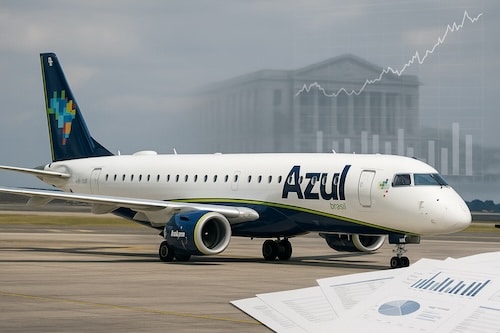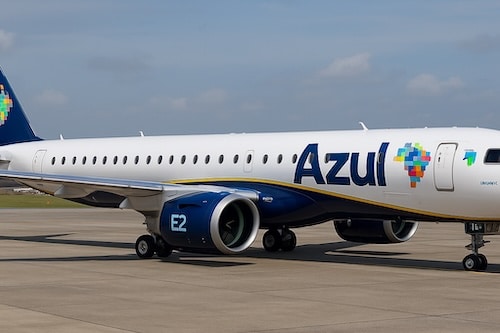

CVM Opens Sanctions Case Against Azul CEO Over Financial Projections
Brazil’s securities regulator, the Comissão de Valores Mobiliários (CVM), has opened a
processo sancionador against John Peter Rodgerson, CEO of
Azul Linhas Aéreas, after concluding in an administrative review that he disclosed
distorted information about the airline’s financial outlook in media interviews given in 2024.
According to Brazilian financial and news outlets that obtained details of the case, Rodgerson is accused of
having presented projections that conveyed a more optimistic picture of Azul’s financial health than what was
supported by internal data at the time, in a context where the company was heavily leveraged and in talks
about a potential combination with GOL.
What Triggered the CVM Investigation?
The administrative process stems from interviews granted by the CEO in 2024 in which he reportedly mentioned:
- An expected revenue of around R$ 20 billion in 2024;
- The possibility of generating an additional R$ 1 billion in revenue in 2025 linked to a new
strategic plan.
These statements were made while Azul was seeking to reassure the market about its financial resilience and
exploring a potential merger with rival carrier GOL. Later, however, the airline requested
Chapter 11–style court protection in the United States and significantly adjusted its network,
cutting dozens of domestic routes while adding new international services, moves publicly linked to financial
pressure.
From Projections to a Sanctions Process
The case was initiated by the CVM’s Superintendência de Relações com Empresas (SEP), which examined
whether the projections disclosed in those interviews complied with Brazilian disclosure rules and with the
duty of accuracy and care required from executives of publicly listed companies.
Based on this review, the regulator decided to open a formal sanctions proceeding in which Rodgerson appears
as a defendant (réu) for allegedly providing distorted projections about Azul’s situation to the
market. Azul’s vice president of finance, Alexandre Malfitani, has also reportedly been
named in the process.
It is important to note that, at this stage, the process reflects allegations analyzed by the regulator; it
has not yet resulted in a final conviction or sanctions, and the defendants retain the right to present
their defenses.
Azul’s and CVM’s Official Positions
In public notes cited by the press, Azul has acknowledged awareness of the administrative process opened in
October 2025 to analyze information provided to the press in 2024, reaffirming its commitment to
transparency and to compliance with applicable regulations, and stating that it remains at the CVM’s
disposal to provide any necessary clarifications.
The CVM itself, following its usual practice, has declined to comment on the specifics of the ongoing case,
merely confirming that the matter is being analyzed under process number 19957.015900/2025–47.
Implications for Investors and the Airline Market
For investors, the opening of a sanctions process against the CEO of one of Brazil’s largest airlines is a
strong reminder of the weight that corporate governance and clear, accurate guidance carry in
a highly leveraged, cyclical industry such as aviation. Projecting confidence to the market is part of an
airline executive’s role—but when projections are seen as inconsistent with underlying numbers, regulatory
risk rises quickly.
The case reinforces key points for anyone following airline stocks in Brazil:
- Always cross-check optimistic projections with quarterly filings and audited financials.
- In sectors with thin margins and high debt, small changes in demand or costs can dramatically alter
forecasts. - Regulatory action—even at the investigative stage—can affect investor sentiment and share-price volatility.
What Happens Next?
The sanctions process at the CVM can result in penalties such as warnings, fines, or restrictions on acting
as an officer or director of a publicly traded company, depending on the final decision of the regulator.
There is no fixed timetable publicly disclosed for its conclusion.
Azul, meanwhile, continues its restructuring and network-adjustment efforts, working to restore confidence
among creditors, shareholders, and passengers. The outcome of the CVM case will be closely monitored by
market participants not only for what it means for Azul and its leadership, but also as a reference point
for disclosure practices among all Brazilian airlines.



